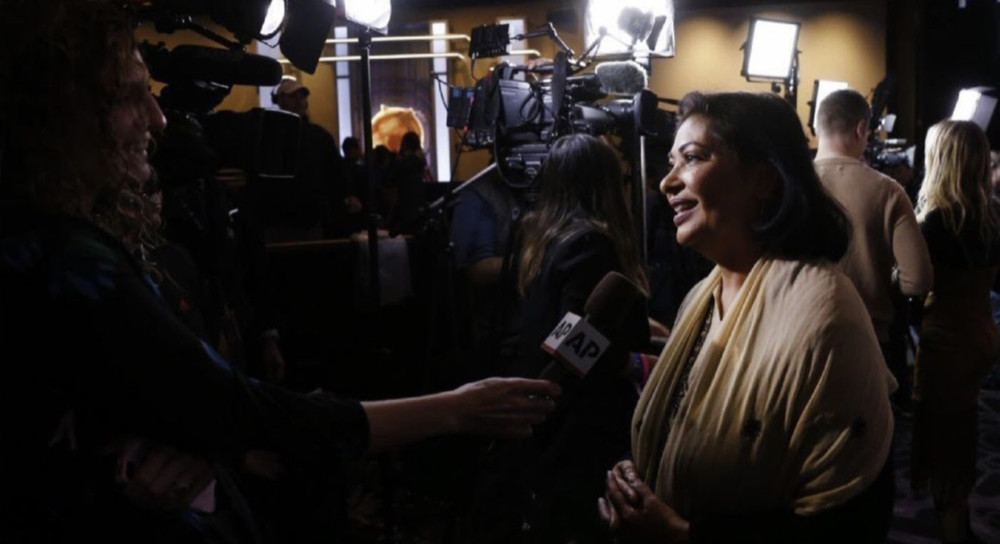By Glenn Whipp
Los Angeles Times
WWR Article Summary (tl;dr) Glenn Whipp takes a look at how the “Committee to Protect Journalists” was given a big boost after one Hollywood’s leading ladies drew attention to the critical work of journalists around the world.
Los Angeles Times
Joel Simon was on the phone catching up with his dad nearly two years ago while his wife and kids watched the Golden Globes.
Meryl Streep was accepting the Cecil B. DeMille lifetime honor, and when Simon, the executive director of the Committee to Protect Journalists, heard Streep say, “We need the principled press to hold power to account,” he told his dad he’d have to call him back.
Simon walked into the living room just as Streep called on the “famously well-heeled Hollywood Foreign Press,” the group that doles out the Globes, and everyone in the Beverly Hilton ballroom to support the Committee to Protect Journalists.
“We are going to need them going forward, and they’ll need us to safeguard the truth,” Streep said, speaking shortly before Donald Trump’s inauguration.
“I was completely surprised,” Simon said.
Flash forward a year later and Simon was attending the Golden Globes when Hollywood Foreign Press Assn. President Meher Tatna announced that the group was donating $1 million to both the Committee to Protect Journalists and the International Consortium of Investigative Journalists.
The CPJ, a nonprofit that promotes press freedom and defends reporters at risk in repressive countries, has an annual operating budget of about $8 million, so the HFPA’s sizable donation, and the publicity accompanying it, goes a long way, Simon said.
“When it comes to the issue of press freedom, the [HFPA] is definitely putting their money where their mouth is,” Simon said, adding that he asked Tatna to chair this year’s CPJ awards dinner, which will be held Tuesday in New York.
Known mainly for throwing the Golden Globes, the splashy, alcohol-friendly annual awards ceremony that’s second only to the Oscars in ratings and media coverage, the HFPA has weathered barbs over the years as a group more interested in gifts and posing for photos with movie stars than celebrating and promoting the art of cinema.
It wasn’t that long ago when the HFPA came under fire for nominating the musical bomb “Burlesque” for best picture (comedy/musical) after enjoying a lavish Las Vegas junket that included a private concert by the movie’s star, Cher.
The group’s longtime publicist, Michael Russell, filed a lawsuit shortly afterward, claiming that he had been fired after telling then-President Phil Berk that members were engaging in “unethical and potentially unlawful deals and arrangements which amount to a payola scheme.” (A settlement was reached in 2013.)
Recent presidents have attempted to burnish the reputation of the HFPA, which consists of 88 active members representing 55 countries.
Nominees for the Golden Globes, once driven by putting A-list talent in the Beverly Hilton Ballroom, have increasingly mirrored the choices of the critical mainstream and the motion picture academy. Nutty nominations, like those for the lumbering thriller “The Tourist,” starring Angelina Jolie and Johnny Depp, appear to be well in the rear-view mirror.
The HFPA’s biggest strides toward respectability have revolved around its philanthropic efforts, work that often goes unnoticed. As a nonprofit, the group must donate a portion of its annual revenues generated from its broadcast deal to televise the Globes. (The HFPA and Dick Clark Productions signed an eight-year contract with NBC in September to continue broadcasting the ceremony, with the network paying roughly $60 million a year for the rights.)
At its annual grants banquet in August, the HFPA awarded $3.25 million in donations to 80 groups, a wide spectrum of nonprofits including the Film Foundation and the Refugee and Immigrant Center for Education and Legal Services, an advocacy organization based in Texas.
The HFPA gave Cal State Northridge’s department of cinema and television arts a $2-million grant in 2015, creating a scholars program for minority students. It gave the school an additional $60,000 at this year’s banquet.
The group also recently donated $300,000 to organizations helping people affected by the California wildfires and the mass shooting in Thousand Oaks.
“We support so many wonderful grantees, and we have seen the impact of our donations, including those for underserved students,” Tatna said. “That vision, that philanthropy, is at the heart of what this group is about today.”
The Mumbai-born Tatna, a reporter for the Singapore daily the New Paper, suggested making this year’s donations to the Committee to Protect Journalists and the International Consortium of Investigative Journalists, believing the grants were a good fit for a group of international journalists.
“In this climate, what better time to support these organizations?” she asked. “They do such yeoman work. It’s a worldwide phenomenon that authoritarian regimes think that they can manipulate the people by repressing journalism.”
Announcing the donations during the Globes was also important, Tatna added, to help publicize the groups’ work.
After Streep gave a shout-out to CPJ in 2017, individual donations to the group nearly tripled, going from $1 million to $3 million.
Simon said this year’s $1-million donation came at a “critical” juncture when more journalists worldwide are imprisoned than at any other time in history.
The grant enabled the CPJ to, among other things, bolster its emergencies program, which helps evacuate threatened reporters and supports their families when they’re jailed.
“Press freedom is declining around the world, and the United States, which was a key ally in defense of press freedom around the world, is no longer playing that role, so we have a lot of work to do,” Simon said. “And that donation, and the visibility that came with it, was a huge boost.”
Tatna said she hopes to announce similar donations to journalism groups at the 2019 ceremony, pending the vote of membership.
“Unfortunately, when you see what is happening around the world, the climate is not getting better,” she said.
“Supporting these groups is essential work.”














































































































































































































































































































































































